Your Planets
Portraits of the Planets
Aspects between Planets
The planetary ages
The planetary families
Planets in Signs
The Planets in comics
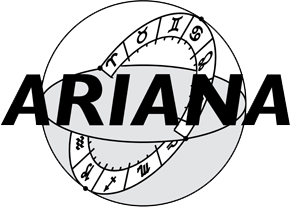

The so-called period “contemplative” of the baby ends at one year, duration of the revolution of the earth around the sun. For what “contemplative” ? Because during these twelve months, the child had only the most reduced motor skills which forced him to be more contemplative than active. During this first year, the outside world appeared to him in the form of an entertaining spectacle, a play written by others, an unknown stage within which he had to learn to familiarize himself with the other actors, to hold its place, to play its role until becoming the star. During this first year, he was almost totally dependent on others: others had to respond to his wishes, wishes, desires, expectations, do things for him. To a large extent, he discovered the world through intermediaries. The world of objects inspired him with a profound indifference: from birth to three months, they were quite simply foreign to him. From three to seven and a half months, they existed for him only if they were visible: they therefore constituted only a sort of extension of his perceptions. From seven and a half months to a year, he learned that they existed independently of him, but essentially in the form of a diagram, a mental representation.

The age of one year marks a radical shift in perspective, a fundamental change in his perception of the world. From a spectator, he becomes an actor. A comfortable dependence gives way to an independence to conquer. Spontaneous sociability is replaced by curiosity about things, and the model child who tried to be as wise as a picture in the solar stage abruptly transforms into an overactive and unruly little devil. It must be said that its development is now under the influence of the planet Mars, which astrological tradition has credited for thousands of years with action, conflict and a taste for brutal experiences.
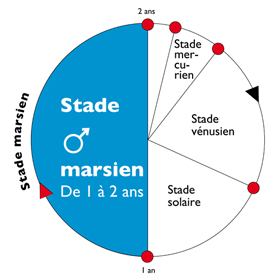
Let us observe him for a moment as he takes his first steps alone, projecting himself with incredible audacity, but also a recklessness tinged with anguish, to encounter a world of which he is unaware of all the dangers: he rushes, intoxicated with his brand new independence… and breaks his face, because he still has everything to learn about the physical laws that govern dynamics and balance. After many “bowls” painful, he instinctively understood these laws, and the walk turns into races, punctuated in turn by new falls. With his recent locomotor autonomy, baby must learn to know and master the many possibilities offered by his body, this structure of flesh, muscles and bones characterized by weight, mass, density, inertia and strength. of which he finally becomes aware of the existence, of which he discovers that he can use it to move freely in space.
From now on, the child becomes one with his body, he feels fully existing as a being of flesh, and lives in an almost permanent hand-to-hand contact with the beings and things that surround him, and most of the “object lessons” which will be administered to him during the Marsian stage, he will not learn them “by heart”, but by body. To his body desiring and enjoying when he manages to grab a distant toy, to move easily from one point to another, to control the movements of his hands with enough dexterity so that the pyramid of cubes he has built don’t crumble. Reluctantly and in pain when he hits himself, pinches himself, burns himself and stomps with rage when he notices that, due to a lack of good coordination between his brain and his still clumsy fingers, the pyramid of cubes has collapsed…
Marsian time is therefore that of wounds and bumps, of the bodily encounter that is both intoxicating and painful with a merciless physical world that no longer has anything of the soft softness of the cradle or the protective arms of its mother, a world strewn bodies other than his own which are so many obstacles, resistances, potential hindrances to a freedom of physical movement which he would like to be total.
Corporeality always: the age of one to two years also sees the appearance of what psychoanalysts call the “anal stage” : the child is keenly interested in the substances that come out of his own body, faeces and urine, fascinating materials that he suckles, feels, touches, experiences. It is during this period that the baby learns, at first reluctantly and then with increasing pleasure, to control his sphincters. Difficult at this age to force the child to relieve himself at specific times, and to hold back in the meantime! At the beginning, he spontaneously resents, and does not lose his temper when he is seated with authority on the pot: he cannot bear that others seek to interfere with his brand new bodily freedom, and shows with malicious pleasure, in doing in his diapers or elsewhere, that he is the sole master of his body. Then, little by little, he realizes that the real personal control of his own body lies in the fact of being able to decide to do or not to do his needs according to the circumstances. Finally, in terms of the undeniable bodily obsession of the child of this age, let us not forget that he often offers his mother, as a gesture of affectionate sharing, of free gift, these products of his body which are for him the most beautiful and the most precious gift that he can make!
Between one and two years old, babies make dazzling progress in terms of motor skills: they learn to stand up without help and to walk without support, climb up and down stairs like a virtuoso, run, jump, climb on chairs and sit down alone at the table, turns the door handles and easily handles bowls, spoons and forks, stacks objects and builds with his toys, pulls the tablecloth to catch an object that escapes him, pulls or pushes his pram with fabulous energy, scribbles on a piece of paper (or on the wallpaper on the walls!) then begins to draw, etc. One word sums it all up: he acts, moves like he has never done before.
At the Marsian stage, the child acts. Non-stop. Without thinking, rarely measuring the consequences of his actions. He has to do, he has to test, he has to explore, he has to experiment. In action, he has no restraint, no awareness of danger, and remains deaf to the advice of caution and moderation that his worried parents lavish on him. It’s make or break, and it breaks a lot at that age. By clumsiness in the manipulation of objects, but also by the child’s desire to experimentally test the solidity of things. Theoretical physics is not his department: he only understands by doing, even if it means causing a lot of damage. To cope with the environment, he cannot and above all wants to rely only on his own means. Hyperactive, he is as much a builder as he is a destroyer: you have to see the joy that inhabits him when he brutally topples the pyramid of cubes that he has laboriously stacked. What he has done, he can undo… and redo to undo it again, in the heat of the moment at point-blank range.
Action for action’s sake, for the pleasure of the act brought to a successful conclusion and the joy that comes from exploring the concrete world suffers no limit, no prohibition. Even worse: what he is absolutely forbidden to do stimulates his desire to discover for himself. He … not “do not” put your fingers in electrical outlets? Baby will never stop starting again, taunting with a little half-innocent, half-provocative air, the adult who has just told him this prohibition. No one has the right to get in the way of his need for experimentation, to curb his sudden impulses that push him to “see what it does” ! Mothers know this well: there is no point in trying to make a child of this age understand verbally that he risks burning himself by putting his hand on a hot plate, without having experienced the pain himself. of the burn. On the other hand, if he is quickly put the tip of a finger on the plate, he will not start again: the thing is done, it is no longer to be done, he has understood “by body”.
To act in order to act, to fully inhabit one’s body, is to feel oneself to exist stronger. To exist is to be totally present in the here and now. In this sense, the one- to two-year-old baby lives totally in a focused, moment-to-moment existence. Neither past nor future: he is entirely in what he does, and his consciousness is consciousness of immediate action. I exist therefore I do. I do therefore I exist. Apart from this raw existence, no other reality makes sense for the child. He is infinitely present to a world that is infinitely present to him, and whose apparent or hidden meaning he never cares about: to exist, to fill space with his active presence is enough for him. Neither goals nor distant prospects. He lives to live, literally absorbed by the chronology of his acts, overflowing with a primitive energy whose self-combustion suffices for his pleasure, saturated with sensations, perceptions, affects as varied as they are exhilarating.
Existence is a constant struggle, a permanent confrontation. You have to do and not let yourself be done, overcome the laws of gravity to continue to stand and walk until exhaustion, refuse to let others act in your place and thus deprive him of his existence. The child at the Marsian stage feels powerfully, through all the fibers of his body, this inescapable reality. Coming out of mom’s skirts, the world is for him a ruthless jungle where certainly danger lurks everywhere, where he takes blows, but where he has the exhilarating feeling of existing only by himself.
To exist full time is also to refuse distance, indifference, letting go or disillusioned gloom, and if there is an extremely rare attitude in a child of this age, it is that of contemplation. passive. He has nothing of a meditative and distant philosopher, taking refuge in abstractions and as if freed from the weight of matter, nothing either of a romantic listening to his moods, nothing of a being released terrestrial contingencies cultivating the height of sight. Nothing. It exists at the level of the daisies. That’s all and that’s enough for him. And woe to whoever would want to show distance or indifference towards him! By his anger, his throwing of cubes or his attacks, he would quickly remind that one of his existence, and force him to exist in front of him.
To exist is to be both in a relationship of duo and duel with the outside world: one must simultaneously “do with” and fight against it to maintain its concrete conditions of existence. To exist is at least to be two, it is to feel opposed to one’s own existence another existence. The one to two-year-old baby practices these existential duo-duel relationships to the fullest extent, if only with his mother. At this age, she is both his indispensable affective and effective partner, and his adversary, the one from whom he must imperatively separate in order to found his independence; his best friend, nurse from the sores of the experience he experiences and his worst enemy, the one who by advising him, by seeking to protect him from the dangers of life, puts himself directly in the way of his path to autonomy. Duo-duel that often resolves into a perpetual confrontation, sometimes complicit, sometimes violent, between the two protagonists-antagonists.
The same type of duo-duel relationship is observed in the relationship that the child maintains with those of his age, whom he now frequents assiduously, whereas previously he showed great indifference towards them. This is the age when two babies can spend long periods face-to-face slapping each other, only getting angry if one of them exceeds the dose beyond which this fun game becomes painful. Duo-duel: it takes two, in duo, to fight and compete against the other… in a duel. The important thing for the child is above all not to be alone, whether face to face with a partner or an adversary.
In the same vein of the duo-duel, we observe a maximum of behaviors of offering, sharing and aggression, of conflict in this age group, both with children of his age and with adults: the baby frequently hands one object to another and agrees to part with it by opening his hand; he also proceeds very often, spontaneously and voluntarily, to exchanges of objects. Duos… We also notice that objects that have been taken, left or have not been used are very frequently returned to their original owner. New form of duo, which shows that if the child has a sense of barter, he does not have that of official market value: he can barter anything for anything, only pure exchange value important to him. Sense of the duel too: the restitution of objects belonging to others proves that the child clearly distinguishes yours from mine.
It remains to list the dueling relationships, which are also very numerous during the Marsian stage, governed, let us recall, by Mars, the planet that rules war according to astrological tradition. The two-year-old baby is certainly not a Rambo in shorts, but not far away: it is between the ages of one and two that threatening and aggressive behavior peaks in him. They are about twice as numerous as in the first year, and in any case incredibly more demonstrative and explicit! In terms of threats, the expressive panoply ranges from verbal (rumble vocalizations in an antagonistic context) to gestures (baby raises his arm or leg and projects them forward in the direction of the other in an attack mimicry), all of which can be spiced up gritted teeth and furrowed brows. On the physical aggression side, he breaks records, throws his toys and other objects in the face of others when he is not happy, kicks the shins, slaps, punches or breaks objects when one opposes frontally his desire to do something.
In a duet or duel, the child at the Marsian stage, in terms of sociability, only really understands a bond based on power relations. He seeks neither to appear (at this age he is no longer interested in his image in the mirror) nor to shine, but constantly measures himself against the other to test his own limits by testing those of the other. In this sense, quite representative in this of the “anal stage” of this period, it behaves like a real “borer”, by systematically opposing, seeking to go to the end of the resistance of others to experience how they react. Somehow it demands that there be “respondent” in front of him and does everything to create conflicting relationships… which he will often then try to resolve and be forgiven by making offerings. Are the warriors on the battlefield not able to make the “peace of the brave” ?
If the child is much less sociable than in the previous stage (he now prefers the world of objects to that of humans), he continues to develop his knowledge of language. Between twelve and fourteen months, he recognizes his name and clearly pronounces three or four words. At two years old, he knows and pronounces at least twenty words, makes two-word sentences, can name four of his toys and listen to the stories he is told. Without being able to tell long stories dotted with sophisticated figures of speech, his language remains completely practical, utilitarian, stripped of all ornament and not bothered with any periphrasis or subtlety.
The child at the Marsian stage begins by connecting two words (always the duo-duel) relating in order to possession: “mom-hat”, then if needed: “eat-banana”, then to location: “toy-bed”, to the attribution of quality: “cat-small”, etc. To understand what the child wants to mean, it is essential to know directly the concrete context within which these “binary sentences” have been issued. For babies of this age, therefore, language is inseparable from the context of which it is the verbal expression at a given moment. He is unable to combine words in such a way that they produce meaning unrelated to the concrete situation he perceives. In other words, he does not know and cannot make language a place for the expression of the imaginary or lies.
He says what he observes and does what he says, in a jargon that is not always understandable for those who are not in the situation. At the limit, language is for the baby of this age only a sound instrument that he can pragmatically use like other objects, when it is impossible for him, for one reason or another, to share and communicate his impressions or understanding of things in fact. Short, stripped down, technical sentences, without imagination, wanting to say, without ambiguity, what they mean: the child at the Marsian stage does not cheat with language and does not use words to cheat. It does not accompany its lapidary description of the facts observed with any commentary or analysis. Neither deep nor brilliant, he speaks truth.
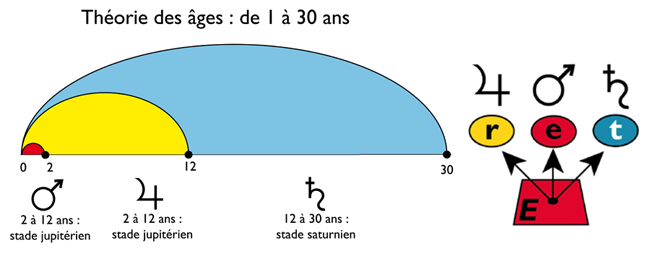
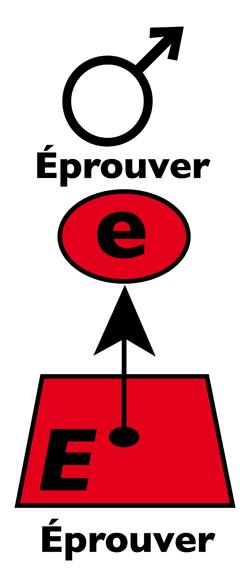
We are in marsian state, like the child of 1 to 2 years, when we feel fully embodied in the present situation, here and now, when we react vigorously and instinctively to the events we are confronted with, when we take beings, things and situations to arm the body, without recoil or project. We are in the Marsian state when we are completely, bodily engaged in what we are doing, when we enjoy our capacity to act, when we live at close range, perfectly centered in our actions.
We are in the Marsian state when we are perfectly at ease in confrontational situations, when we do not hesitate to directly and immediately oppose what we refuse, when we mobilize all our energy to quickly solve a practical problem. We are in a Marsian state when we do not pay ourselves with useless words, when we play our cards on the table, when we show courage and frankness, when the obstacles we encounter on our way stimulate and excite us.
We are still in a Marsian state when we control our body and our reactions by a self-discipline which owes nothing to education, when we only take into account the facts and them alone to orient us in existence, when we maintain a duo-duel relationship with nature or with the beings that inhabit it. We are in a Marsian state when we practice the method “trial and error” to progress, when, faced with a hitherto unknown object, we prefer to test it directly rather than consulting its instructions, when we set off on an adventure without a compass, for the simple pleasure of discovery.
We are always in a Marsian state when we consider that it is at the foot of the wall that we see the mason, that we believe only in the results of experience and that we are wary of theories too far removed from lived reality, when we openly rebel against those who claim to tell us what to do, when we refuse to surrender to fate, when we experience strong, intense, stimulating sensations, when adversity does not scare us. We are in the Marsian state when we build or destroy tangible and material things.
We are finally in a Marsian state when we always feel ready for a struggle, a battle, a fight with an uncertain outcome, expecting neither glory nor recognition, but simply the satisfaction of having carried out our necessary actions for good end, when we give ourselves the concrete means to act effectively, when we stamp with impatience at the idea of acting, when we cannot stand the useless chatter, the hypocrisies of social life, the binding norms and hierarchies, when we always consider the other as our equal, when we need adversity to move forward.
With a strong and dominant Mars in his birth chart, the individual very frequently experiences these Marsian states: we will then say that he is a frank and active individual, with a practical mind, with an ardent and combative temperament, tumultuous and impatient. If Mars is weak and non-dominant in his chart, the individual may experience great difficulty in commonly accepting the reality of the facts, in showing frankness and combativeness most of the time; the irruptions of the Marsian function in his experience will often be unsuitable (eg: rare but unbridled aggressiveness because uncontrolled occurring after long periods of repression of face-to-face meetings and confrontations).
▶ The Marsian: Psychological profile
▶ The marsian function ‘eE’ (existence of Existence)
▶ Sun-Mars-Pluto: extensive Power
▶ Mars-Jupiter-Saturn: extensive Existence
▶ Venus-Mars-Neptune: intensive existence
▶ Quand la sociologie découvre Mars
▶ Fondements et méthodologie de l’interprétation de Mars en conditionalisme
▶ Introduction to the Theory of Planetary Ages
▶ L’échéancier planétaire et la Théorie des âges
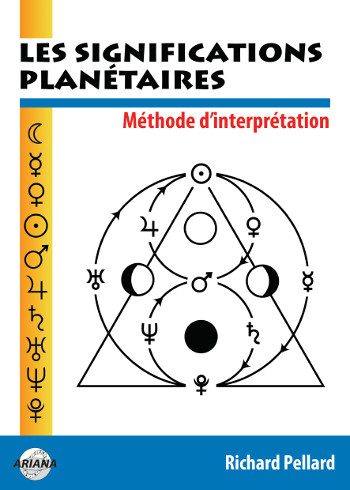
Les significations planétaires
par
620 pages. Illustrations en couleur.
La décision de ne traiter dans ce livre que des significations planétaires ne repose pas sur une sous-estimation du rôle des Signes du zodiaque et des Maisons. Le traditionnel trio Planètes-Zodiaque-Maisons est en effet l’expression d’une structure qui classe ces trois plans selon leur ordre de préséance et dans ce triptyque hiérarchisé, les Planètes occupent le premier rang.
La première partie de ce livre rassemble donc, sous une forme abondamment illustrée de schémas pédagogiques et tableaux explicatifs, une édition originale revue, augmentée et actualisée des textes consacrés aux significations planétaires telles qu’elles ont été définies par l’astrologie conditionaliste et une présentation détaillée des méthodes de hiérarchisation planétaire et d’interprétation accompagnées de nombreux exemples concrets illustrés par des Thèmes de célébrités.
La deuxième partie est consacrée, d’une part à une présentation critique des fondements traditionnels des significations planétaires, d’autre part à une présentation des rapports entre signaux et symboles, astrologie et psychologie. Enfin, la troisième partie présente brièvement les racines astrométriques des significations planétaires… et propose une voie de sortie de l’astrologie pour accéder à une plus vaste dimension noologique et spirituelle qui la prolonge et la contient.
Téléchargez-le dès maintenant dans notre boutique
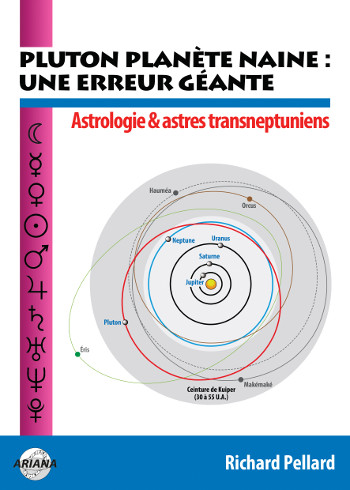
Pluton planète naine : une erreur géante
par
117 pages. Illustrations en couleur.
Pluton ne fait plus partie des planètes majeures de notre système solaire : telle est la décision prise par une infime minorité d’astronomes lors de l’Assemblée Générale de l’Union Astronomique Internationale qui s’est tenue à Prague en août 2006. Elle est reléguée au rang de “planète naine”, au même titre que les nombreux astres découverts au-delà de son orbite.
Ce livre récapitule et analyse en détail le pourquoi et le comment de cette incroyable et irrationnelle décision contestée par de très nombreux astronomes de premier plan. Quelles sont les effets de cette “nanification” de Pluton sur son statut astrologique ? Faut-il remettre en question son influence et ses significations astro-psychologiques qui semblaient avérées depuis sa découverte en 1930 ? Les “plutoniens” ont-ils cessé d’exister depuis cette décision charlatanesque ? Ce livre pose également le problème des astres transplutoniens nouvellement découverts. Quel statut astrologique et quelles influences et significations précises leur accorder ?
Enfin, cet ouvrage propose une vision unitaire du système solaire qui démontre, chiffes et arguments rationnels à l’appui, que Pluton en est toujours un élément essentiel, ce qui est loin d’être le cas pour les autres astres au-delà de son orbite. Après avoir lu ce livre, vous saurez quoi répondre à ceux qui pensent avoir trouvé, avec l’exclusion de Pluton du cortège planétaire traditionnel, un nouvel argument contre l’astrologie !
Téléchargez-le dès maintenant dans notre boutique